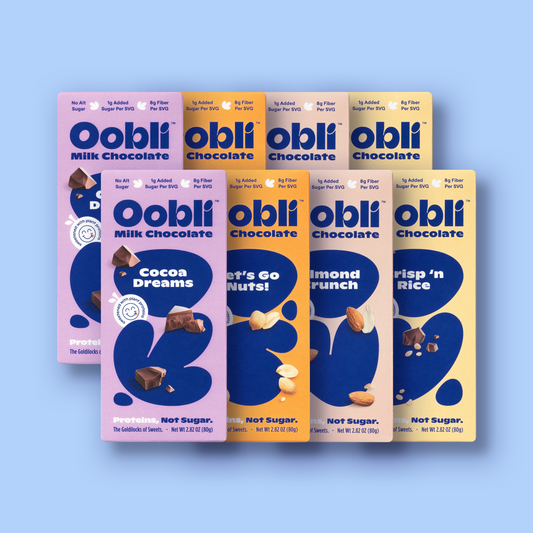Listen up, Coke lovers. If you enjoy cracking open a can of icy cold cola, we’re about to share some hard truths. Do you know how much sugar is in a can of Coke? It’s pretty alarming, and it’s damaging your health with every sip.
Today, we’re going to show you just how much sugar is in a 12 oz can of Coke, and why you should care. We’ll also break down whether sugar free drinks are actually better for you than Coke, and the dangers that can come from consuming artificial sweeteners.
It’s not all doom and gloom, though! Once you learn how much sugar is in a can of Coke, there’s a good chance you’ll want to find a healthier alternative. Stay tuned, because we’ve got the perfect, low-sugar option that tastes great without the sky-high sugar content!
How Much Sugar is in a Can of Coke?
As we savor the effervescence and distinct flavor of a can of Coke, the question lingers - just how much sugar is packed into that seemingly innocent aluminum container? Let’s dive beyond the fizz and take a look at the (somewhat scary) numbers.
The Sugary Statistics: Breaking Down the Numbers
Let's start with the numbers that lurk behind the refreshing facade. A standard 12-ounce can of Coca-Cola contains a surprising amount of sugar. In fact, there are 39 grams of sugar in a single can of Coke.
To put that into perspective, it’s ten teaspoons of sugar. Imagine making a cup of tea or coffee and adding TEN TEASPOONS of sugar. It’s just unheard of. But that’s exactly what you’re drinking every time you crack into a can of Coke.
The Hidden Costs of High Sugar Consumption
Sure, you might enjoy the taste of Coke, but what’s the cost of all that sugar, really? In terms of your health, the cost is significant. Here are some of the risks that come with excessive sugar intake, which a single can of Coke can contribute to:
- Weight gain and obesity
- Heightened risk of developing type 2 diabetes
- Increased risk of heart disease and other cardiovascular issues
- Dental decay, resulting from the acidic nature of sugary drinks
Plus, many people find that the more sugar they consume, the more they crave. It’s a cycle that’s very hard to break, and can have a serious impact on your health in the long term.
How Does Coke’s Sugar Content Compare to Other Soft Drinks?
We’re calling out Coke here, but it’s certainly not the only culprit! Pepsi (41g), Sprite (44g), Fanta (42g), Dr Pepper (40g), and Mountain Dew (46g) all contain comparable or even slightly higher levels of sugar than Coke. Yikes!
Are Sugar-Free Coca-Cola Products Better for You?
So, we now know how much sugar is in a can of Coke, and the potential health implications of regularly consuming that much sugar. But what about sugar-free or low-sugar alternatives? How much sugar is in a can of Diet Coke, and is it any better for you?
Diet Coke contains no added sugars, yet it still tastes sweet. This is because it’s sweetened with artificial sweeteners, like almost all “diet” or “sugar-free” products. So, are these better for you? Not exactly, as artificial sweeteners come with their own issues. Here’s what you need to know.
The Lowdown on Sugar-Free: Ingredients and Sweeteners Used
Different diet drinks use different artificial sweeteners, whether it be Splenda vs stevia or stevia vs sucralose. Diet Coke usually contains aspartame as the main artificial sweetener. Aspartame, though widely used, brings some specific health concerns, which we’ll get to next.
There are also diet drinks without aspartame, which typically contain steviol glycosides (derived from stevia) or other sweeteners. Many products also use sugar alcohols like erythritol, but there’s been some alarming recent research that’s led many people to look for a safer erythritol substitute.
So, how much sugar is in a can of Diet Coke? While the diet version contains no sugar, it is full of artificial sweeteners, which bring their own set of problems. Here’s why artificial sweeteners are raising eyebrows for their health risks.
Health Implications of Sugar-Free Alternatives
Sugar-free alternatives may not come with the health risks of sugar, but each artificial sweetener brings its own concerns. For example, aspartame can cause migraines, mood disorders, digestive issues, and may even cause weight gain.
In terms of stevia, there are questions around the safety of stevia during pregnancy, and stevia was actually banned in the 1900s by the FDA due to concerns around reproductive health and blood pressure.
Sucralose too can have a big impact on the gut microbiome and causes inflammation. It’s also been associated with neurological issues and migraines - you can learn more about how to get rid of a sucralose headache here.
What about other sweeteners like erythritol? Is sugar alcohol bad for you? Recent research into erythritol suggests that it could be the most dangerous sweetener of all, causing many people to double-check what has erythritol in it and avoid those products entirely.
Scientists found that people consuming high levels of erythritol were around twice as likely to experience a serious cardiovascular event, like heart disease or stroke. While more research needs to be done, this research raises some scary questions about erythritol’s safety.
What are Some Healthier Alternatives to Coke With Less Sugar?
So, if artificial sweeteners are just as bad (or even worse) for your health as sugar, what are some alternatives that bring the taste without the harmful effects? Luckily, there’s a revolutionary sweetener in town, and it’s 100% natural! Meet the future of safe sweetening: sweet proteins.
The Rise of Sweet Proteins: A New Era of Sweetness
Sweet proteins are compounds naturally found in certain tropical fruits. They can be an incredible 5,000x sweeter than sugar, which means that only a tiny amount is needed to sweeten your favorite drinks.
As well as being all-natural, sweet proteins contain antioxidants and anti-inflammatory compounds. Not only do they avoid the health risks of artificial sweeteners, but they can actually benefit your health with every sip!
Oobli's Sweet Protein-Infused Tea: A Guilt-Free Indulgence
At Oobli, we’re obsessed with sweet proteins. We’ve harnessed their power to make healthy versions of your favorite beverages, including our deliciously guilt-free sweet iced tea. You won’t know from the taste that there’s only 7g of sugar in each 16 oz can.
Remember how much sugar is in a 12 oz can of Coke? 39 grams. With Oobli’s sweet iced tea, you can enjoy an incredible, fruity beverage that’s naturally sweetened and contains just a fraction of the sugar of Coke. Plus, our amazing fruity flavors will have you hooked in no time!
If you’re looking for other guilt-free sweet treats, don’t miss our decadent chocolate for sale - it will become your go-to snack before you know it. With 4g of sugar (and just 1g of added sugar) in each serving, you could eat 10 whole bars for the same amount of sugar as one can of Coke!
Tips on Cutting Back on Coke
If you’re not ready to entirely cut Coke out of your diet, you might find it easier to slowly start reducing your intake. Here are some simple tips to get you started:
- Gradually reduce your Coke intake and set specific daily limits for yourself
- Try replacing Coke with alternative, healthier drinks like Oobli iced tea
- Make water your go-to beverage and keep a refillable bottle by your side all day
- Pair your meals with water or herbal tea instead of Coke
- Let your family and friends know about your goals so they can support you
Reducing your Coke consumption isn’t easy, but it’s an important step toward better health, and could save you from some serious complications down the road.
Final Thoughts on How Much Sugar is in a Can of Coke
So, how much sugar is in a can of Coke? Coke, contains a staggering 39 grams of sugar in each can, and most other sodas are equally high in sugar. While diet sodas might skip the sugar, they are high in artificial sweeteners which can bring some serious health risks of their own.
Luckily, there’s a better option! Oobli’s sweet iced tea contains no artificial sweeteners, and is sweetened naturally with sweet proteins. A 16 oz can of our sweet iced tea contains just 7 grams of sugar, and no harmful additives. It’s a guilt-free, healthy alternative, and it’s full of flavor!
Shop Oobli today and taste the difference for yourself!




